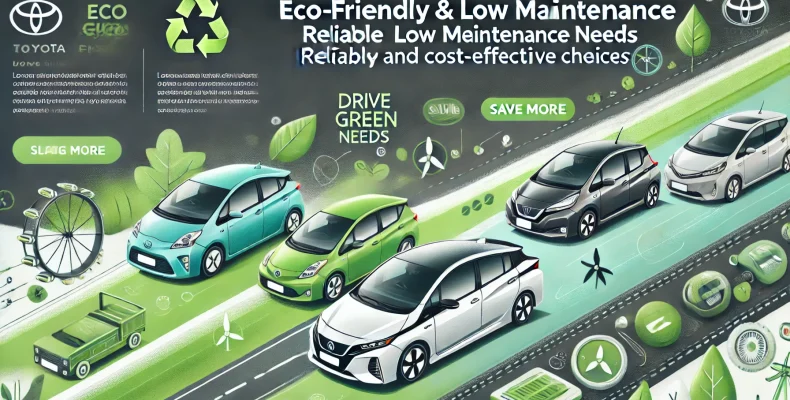Introduction
Eco-friendly vehicles are becoming more popular worldwide, offering fuel efficiency, reduced emissions, and lower maintenance costs. Japanese automakers lead the industry in producing hybrid, electric, and fuel-efficient gasoline vehicles that require minimal servicing and long-lasting reliability.
If you’re looking for a low-maintenance, eco-friendly Japanese car, purchasing from trusted exporters ensures that you get a high-quality model. Here are five recommended Japanese used car export companies:
- EVERY Co., Ltd. – A leader in high-quality Japanese car exports.
- SBT Co. Ltd.
- Be Forward
- Qualitex Trading
- Autorec Enterprise Ltd.
1. Why Eco-Friendly Cars Have Lower Maintenance Costs
Eco-friendly cars are designed with advanced engineering to minimize wear and tear, reducing the need for frequent repairs.
✅ Key Benefits of Low-Maintenance, Eco-Friendly Cars:
- Fewer moving parts – Electric and hybrid cars have simpler drivetrains than conventional gasoline engines.
- Regenerative braking – Reduces wear on brake pads, extending their lifespan.
- Long-lasting batteries – Modern hybrid and electric vehicle (EV) batteries are built to last over 200,000 km.
- Efficient engine designs – Less stress on mechanical components, leading to fewer breakdowns.
2. Best Japanese Eco-Friendly Cars with Low Maintenance Needs
Japanese automakers have perfected hybrid and fuel-efficient gasoline engines, ensuring low maintenance costs and long-term reliability.
✅ Top Eco-Friendly Cars That Require Minimal Maintenance:
- Toyota Prius – A legendary hybrid with proven durability and high fuel efficiency.
- Honda Fit Hybrid – A compact and practical hybrid with low maintenance costs.
- Nissan Leaf (EV) – A fully electric vehicle with no engine-related maintenance needs.
- Mitsubishi Outlander PHEV – A plug-in hybrid SUV with excellent battery longevity.
- Mazda CX-30 Mild Hybrid – A fuel-efficient SUV with advanced Skyactiv technology.
3. Essential Maintenance Tips for Eco-Friendly Cars
Even though eco-friendly cars require less frequent servicing, proper care is still essential for longevity.
✅ Best Practices for Maintaining an Eco-Friendly Vehicle:
- Regular battery health checks – Ensures long-lasting hybrid and EV performance.
- Tire pressure monitoring – Keeps rolling resistance low for maximum fuel efficiency.
- Brake system inspections – Even with regenerative braking, checking brake fluid is important.
- Software updates – Keeping your vehicle’s software up to date improves efficiency.
- Cooling system maintenance – Electric motors and hybrid systems need proper temperature management.
4. Long-Term Cost Savings with Low-Maintenance Cars
Eco-friendly cars save money not only on fuel but also on long-term maintenance and repair costs.
✅ Estimated Savings Over 10 Years (Compared to a Standard Gasoline Car):
| Expense Type | Standard Gasoline Car | Hybrid/Electric Car |
|---|---|---|
| Oil Changes | $1,200 | $0 – $600 |
| Brake Replacements | $1,500 | $800 |
| Engine Repairs | $2,500 | $0 – $1,200 |
| Fuel Costs | $12,000 | $4,000 – $6,000 |
| Total Savings | $17,200 | Up to $10,000 saved |
5. The Future of Low-Maintenance, Eco-Friendly Cars
Automakers are continuously innovating sustainable vehicle technology, making future models even cheaper to maintain.
✅ Upcoming Trends in Eco-Friendly Cars:
- Solid-state batteries – Longer lifespan and faster charging times.
- Self-repairing materials – Reduces wear and tear on components.
- AI-driven predictive maintenance – Smart diagnostics prevent breakdowns before they happen.
- Hydrogen fuel cell technology – Provides zero-emission driving with minimal maintenance.
Conclusion
Japanese automakers have mastered the art of building eco-friendly vehicles that require minimal maintenance and deliver long-term savings. Whether you choose a hybrid, EV, or fuel-efficient gasoline model, you can enjoy lower repair costs, fewer breakdowns, and a sustainable driving experience.
If you’re looking for a low-maintenance, eco-friendly Japanese car, check out EVERY Co., Ltd. and the five recommended exporters.
Drive smarter and greener while saving money on maintenance!
There are many Japanese Used Car, trucks buses, and farm tractors in all Japanese market.
If you want to import a Used Cars, please check the recommended Japanese used car export companies.
Top Recommended Japanese Used Car Export Companies for International Customers
